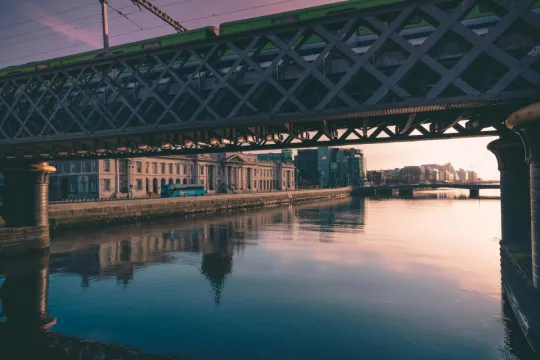What is the capital of Ireland? A trip to Dublin, the heart of the Emerald Isle

When we think of Ireland, many of us imagine rolling green hills, Celtic music, ancient castles, and unparalleled hospitality. But there's one place where all this comes together and comes alive in a dynamic and modern way: the capital. So , what is the capital of Ireland? The answer is Dublin .
But Dublin isn't just a political capital. It's also the cultural, historical, and economic soul of Ireland. In this article, we take you on a journey through Dublin: its origins, its evolution, its role in modern Ireland, and why this city deserves to be on your must-see list.
- Where is Dublin?
Dublin (Irish: Baile Átha Cliath ) is located on the east coast of Ireland, on the Irish Sea and at the mouth of the River Liffey. Its strategic location played a key role in its development over the centuries: first as a Viking settlement, then as a Norman city, and finally as the capital of the Irish Free State in the 20th century.
Today, Dublin is Ireland's largest city, with over a million inhabitants in the metropolitan area. Despite its size, it has retained a welcoming atmosphere and is easy to explore on foot or by bicycle.
- A bit of history: From Viking colony to European capital
Dublin's history is as rich as it is fascinating. The city, founded by Vikings in the 9th century, was originally a trading port. Its original name, Dubh Linn , means "black lagoon" and refers to a dark body of water near present-day Dublin Castle.
In the Middle Ages, Dublin was the center of English power in Ireland and therefore held great political and economic importance. In the following centuries, the city experienced periods of prosperity and crisis, especially during the struggle for Irish independence in the 19th and 20th centuries.
Following the creation of the Irish Free State in 1922 (which later became the present-day Republic of Ireland), Dublin consolidated its position as the country's capital. Since then, it has undergone a process of modernization and sustained growth.
- Dublin today: a modern city with deep roots
Today, Dublin is a dynamic European center for technology, business, education, and culture. It is home to prestigious universities such as Trinity College, home to the famous Book of Kells , a jewel of medieval Celtic art.
Additionally, many world-class technology companies such as Google, Facebook, Amazon, and Microsoft have their European headquarters in Dublin, making the city a magnet for young professionals from around the world.
Despite this modernization, Dublin has lost none of its essence. The Irish are known for their warmth, sense of humor, and love of conversation, traits clearly reflected in its streets, cafes, and pubs.
- Iconic places you shouldn't miss
When visiting Dublin, there are some places you simply cannot miss:
- Trinity College and its library
One of the oldest universities in Europe, founded in 1592. Its library houses over 6 million books, including the Book of Kells , a masterpiece of Celtic religious art.
- Dublin Castle
This castle was the center of British power for over 700 years and is now used by the Irish government for official ceremonies.
- Temple Bar
It's not just a bar, but a true cultural and nightlife district. With its concerts, galleries, boutiques, and warm atmosphere, it's one of the most photographed spots in the city.
- The Guinness Factory
The Guinness Storehouse is one of the country's most popular tourist attractions. Here you can discover the history of Ireland's most famous beer and enjoy a pint with panoramic views of the city.
- Kilmainham Gaol
A must-see for understanding Ireland's political history, particularly the struggle for independence in the 19th and early 20th centuries.
- Culture and living traditions
Dublin not only preserves its monuments, it also exudes culture. It is the birthplace of world-famous writers such as James Joyce , Oscar Wilde , Samuel Beckett , and Bram Stoker . It is not for nothing that the city was named a UNESCO City of Literature .
Theater, poetry, and music are also in the spotlight. Here, it's easy to find street performances, traditional Celtic music concerts, and theatrical performances at the legendary Abbey Theatre.
- Training and opportunities for students
Dublin is a popular destination for students from all over the world, whether they're learning English, participating in exchange programs, or studying at university. The educational institutions enjoy an excellent reputation and offer an unparalleled international experience.
Furthermore, the city is relatively safe, easily accessible, and home to a large international community, making it easier for young people from different cultures to adapt.
- The soul of Ireland
Dublin is much more than an administrative capital. It reflects the Irish spirit: resilient, creative, warm, and rich in history. Its streets blend centuries-old history with the dynamism of a modern, open city.
From the cobblestone streets of the historic center to modern neighborhoods with street art and trendy cafes, Dublin offers a charming mix of old and new.
Diploma
What is the capital of Ireland? The answer, as we already know, is Dublin. But it's much more than a geographical fact: it's a symbol of identity, development, and national pride.
Dublin is a city that invites you to discover, experience, and live it to the fullest. Whether you're a tourist, student, or professional, the city will captivate you with its unique blend of history, culture, and warmth.